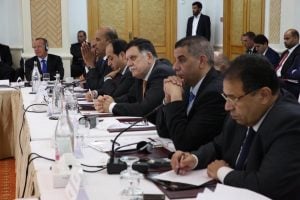By Libya Herald staff.

Tunis/Tripoli 6 September 2016:
Efforts to rebuild political support for the Presidency Council (PC) through a new two-day session in Tunis of the UN-brokered Libya Dialogue appear to have made little significant progress by the time it ended this evening although PC member Abdel-Salam Kajman has said that it agreed to stick with the Libyan Political Agreement. For his part, UN Special Envoy Martin Kobler said the gathering had been “very constructive”.
However, in what was a distinct move forward, all members of the Presidency Council (PC), including boycotters Omar Al-Aswad and Ali Gatrani, were also in attendance during the day and managed to thrash out ideas on the composition of the new Government of National Accord.
According to Aswad, who had boycotted the PC until Sunday over its previous two cabinet proposals, the Presidency meeting had been very positive and there was agreement on an initial cabinet list. His main complaint, he said, was that two hours had not been enough to resolve very complicated issues. However, it had been agreed to find a suitable venue as soon as possible for a next PC meeting at which the new cabinet would be agreed.
The choice of a suitable venue is to meet the objections of Gatrani who refuses to go to Tripoli while, he says, it is controlled by militias.
Gatrani, who is said to have had a sharp verbal spat with Presidency Council head Faiez Serraj at one point during the meeting, is reported as insisting that Colonel Al-Mahdi Al-Barghathi be removed as defence minister. In his place, he suggested that Serraj take over the post or that he, Gatrani, be allowed to nominate someone else for the job.
The PC also met with members of the Libya Dialogue, all of whom, together with a number of elders and other stakeholders and advisers, were invited to Tunis by UN Special Envoy Martin Kobler in a bid to achieve consensus on Libya’s needs and support the nine-member Presidency.
In the event, there were arguments ranging from who should be at the meetings to calls for the Presidency Council to be sacked.
When the Libya Dialogue session started yesterday it immediately ran into difficulties over the presence of the new 13-member Dialogue committee appointed this week by the head of the House of Representatives (HoR), Ageela Saleh. Most of the group were not allowed into the meeting on the basis that, other than Emhemed Shouaib, its leader and the leader of the HoR team at the Dialogue all of last year, and two other previous HoR members of theLibya Dialogue), they had not been invited.
The Libya Dialogue, having been created by the UN Support Mission in Libya, meets at its invitation. The current meetings were consequently limited to those involved in previous sessions. (Shouaib himself is said not to have been consulted about the new committee he was supposed to head.)
Those who did attend included Sharif Al-Wafi and Tawfik Shuhaibi. Both started boycotting the Dialogue a year ago, mainly in protest at its procedures. Shuhaibi tweeted that he had decided to return because of pubic demand, and not, as was being suggested, to sabotage the event.
There were, however, objections to their presence on the basis that they had not approved last December’s Libya Political Agreement (LPA). Shuhaibi also caused a stir yesterday when he called for an earlier version of the agreement to replace the current one, apart from Serraj. The Presidency Council (PC) , he said, had completely failed and for dialogue to succeed it had to be replaced by a smaller body of Serraj and two deputies.
Calls for changes to the PC composition were supported by Belgassem Igzeit, formerly a member of the General National Congress (GNC) for Misrata but now of the State Council.
(Igzeit is currently at odds with State Council President Abdulrahman Sewehli who wants legal action taken against him and two other State Council for having had discussions in Beida with members of the GNC’s 94 Bloc who were not allowed to joined the State Council and who have since formed a parallel council in Benghazi.)
Yesterday evening’s session saw discussion of the articles 16 and 17 of the LPA, under which the HoR is suppose to hold a session to decide a new venue for its meetings, evaluate its procedures and decisions reached before boycotting members joined its ranks its and form new committees.
None of this has been done.
The Dialogue session ended this evening with a meeting with a number of foreign ambassadors and envoys resulting in a tweet from UK ambassador Peter Millett: “No alternative to #LPA to bring security & stability”.
Kobler tweeted: “International community expressed great respect for Libyan sovereignty and support for Pres. Council as it prepares new government proposal”.
The Libya Dialogue also met with Central Bank of Libya governor Sadek Elkabir.











